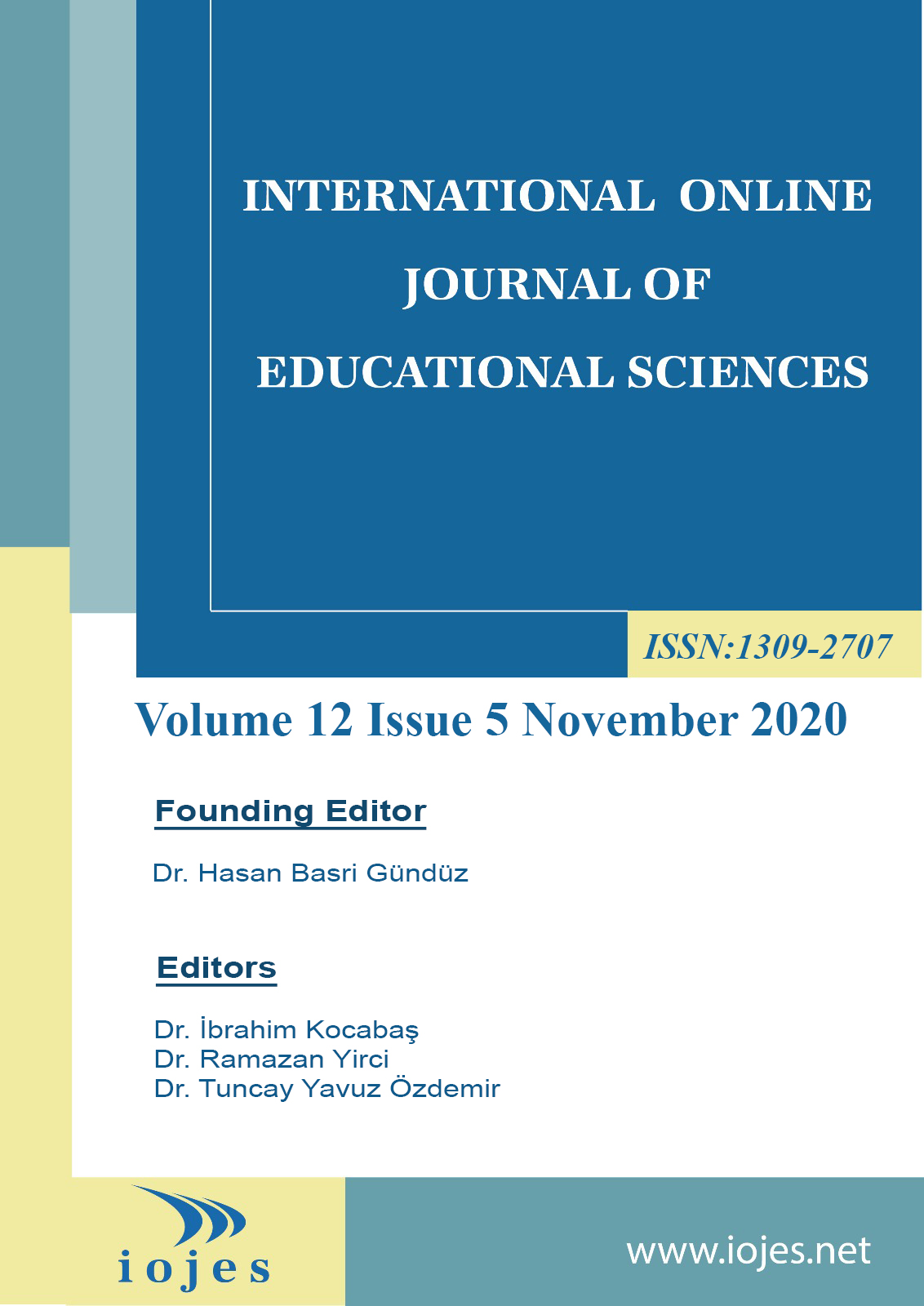The Effect of Well Done Cards Used as a Motivation Tool in Turkish Teaching on the Attitudes of Secondary School Students towards Turkish Course
Author :
Abstract
Bu araştırmada ortaokullarda Türkçe dersi öğretiminde bir motivasyon (güdüleme) aracı olarak kullanılan aferin kartının öğrencilerinin Türkçe dersine yönelik tutumlarına etkisi ve öğrencilerin aferin kartına ilişkin görüşleri araştırılmıştır. Karma modelin kullanıldığı bu çalışmada 2017-2018 öğretim yılında Erzurum Yakutiye 1071 Malazgirt Ortaokulunda öğrenim gören yüz öğrenciyle mülakat yapılarak öğrencilerin aferin kartı uygulaması hakkındaki görüşleri belirlenmeye çalışılmıştır. Araştırmada öğrenci görüşleri nitel yöntemlerle tutum ölçeği ise nicel yöntemlerle analiz edilmiştir. Öğrencilerin Türkçe dersine karşı tutumları Türkçe dersi tutum ölçeğiyle belirlenmiştir. Öğretim yılı sonunda öğrencilerin aferin kartı uygulaması hakkındaki görüşlerine yapılandırılmış mülakat yöntemiyle başvurulmuştur. Öğrencilerin görüşlerinden elde edilen veriler, önem sırasına göre sınıflandırılmıştır. Görüşmelerin analizi sonucunda öğrencilerin % 88’inin uygulamadan memnun oldukları ve uygulamanın bütün derslere yayılmasını istedikleri tespit edilmiştir. Araştırmanın başında ve sonunda uygulanan Türkçe dersi tutum ölçeği verileri SPSS 23.00 programında analiz edilmiş ve öğrencilerin derse karşı olan tutumlarının olumlu yönde değiştiği gözlenmiştir. Ayrıca araştırmada ortaokul öğrencilerin derslere karşı ilgisinin ve derslerdeki başarısının artırılması için yapılacak çalışmaların çeşitliliği hakkında paydaşlara önerilerde bulunulmuştur.
Keywords
Abstract
In this study; the effect of well done cards, these cards are used as a motivation tool in Turkish course in secondary schools, on students' attitudes towards Turkish course is studied, and students' opinions on well done cards are analyzed. This study, in which a mixed model is employed, seeks to reveal the opinions of 100 students who study at Erzurum Yakutiye 1071 Malazgirt Secondary School on well done card application, using the data obtained from interviews with these students on this application. In the study, student opinions are analyzed with qualitative methods, and the attitude scale is analyzed with quantitative methods. Students' attitudes towards Turkish course is analyzed with the Turkish course attitude scale. At the end of the academic year, the opinions of the students participating in the study on the application of well done cards are taken, using structured interview method. Data obtained from students' opinions are classified in order of importance. According to the results of the interviews, it is found that 88 % of the students are pleased with this application and state that they want this application to be used in all courses. The data of Turkish course attitude scale, this scale is applied at the beginning and at the end of the study, is analyzed with SPSS 23.00 program, and it is observed that students' attitudes towards the course have changed positively. In addition, suggestions for the relevant stakeholders on different activities aimed at increasing secondary school students' interest in learning courses and increasing academic achievement are made.
Keywords
- Alan, U. (2006). Motivation Theories and Effects of Motivation on Business Life, (Unpublished Master Thesis). Beykent University Institute of Social Sciences, Istanbul.
- Allport, G. W. (1967). Attitudes, readings in attitude theory and measurement. New York: John Willey & Sons.
- Bıyıklı, C. (2014). Attitudes of Secondary School Students towards Turkish Course and Concepts of Academic Self, Journal of Uludağ University Faculty of Education 27 (1), p. 231-254.
- Cevizci, A. (2010). Education dictionary, Istanbul: Say Publishing.
- Cole, l. & Morgan, J.B. (2001). Childhood and youth psychology, (Vassaf, B.H., Translator), Istanbul: MEB Publishing.
- Deniz, S., & Tunal, S (2006). Primary school students' attitudes towards Turkish lesson: Köyceğiz sample. National education journal, 34 (170).
- Ekiz, D. (2009). Scientific research methods, Ankara: Anı Publishing.
- Fidan, M. and Eren, A. (2017). “Relationship Between Secondary School Students' Attitudes Towards Turkish Course and Their Motivation Regarding Education”, Hacettepe University Faculty of Education Journal, 32 (2), p. 480
- Göçer, A. (2018). Turkish learning and teaching approaches-text processing process-micro teaching application example. Ankara: Pegem Academy.
- Güvendir Acar M. (2014). The Relationship between Student and School Characteristics and Turkish Achievement in Student Achievement Assessment Exam, Education and Science, 39 (172), p.163-180.
- Işık, Y. (2014). Motivation miracle, Istanbul: Sis Publishing.
- İnceoğlu, M. (1993). Attitude perception communication. Ankara: V Publications.
- Karasar, N. (2011). Scientific research method (22nd edition). Ankara: Nobel Publishing.
- Kurnaz, H. & Yıldız, N. (2015). Evaluation of Secondary School Students Reading Motivation according to Certain Variables, Turkey Social Research (TSA) Journal, 19 (3), p.53-70.
- Öz, F. (2003). Applied Turkish teaching. Ankara: Anı Publishing.
- Sarıer, Y. (2016). Factors affecting the academic achievement of students in Turkey: A meta-analysis study. Hacettepe University Journal of Education, 31 (3), 609-627.
- Şahin, A. (2011). Analysis of Primary and Secondary School Students' Achievements in Terms of Various Variables, Atatürk University Social Sciences Institute Journal, 15 (1), p.311-326.
- Şahin, A. (2011). Profession and teaching. Sonmez V., Editor , Introduction to Educational Science (265-309). Ankara: Anı.
- Şahin, Ç., Karakuş, G. (2019). Choosing participants: the universe and by sample, Ocak G., Editor, Scientific Research Methods in Education (180-216). Ankara: Pegem Academy.
- Schunk, D. (2012). Learning theories an educational perspective, Pearson Publishing, Boston.
- Tavşancıl, E. (2012). Measuring attitudes and data analysis with spss. Ankara: Nobel Publishing.
- The Ministry of National Education (2006). Primary education Turkish course curriculum and guide, 1st Edition, Ankara: MEB Directorate of State Books.
- The Ministry of National Education (2019). Turkish course curriculum (primary and secondary school 1, 2, 3, 4, 5, 6, 7 and 8th grades), Ankara: MEB Publishing.
- Thurstone, L. L., & Fishbein, M. (1967). Attitudes can be measured, readings in attitude theory and measurement. Ed: Martin Fishbein. New York: John Wiley & Sons, inc.
- Topçuoğlu Ünal, F. & Bursalı, H. (2013). Opinions of Turkish Teachers Regarding Motivation Factors, Middle Eastern & African Journal of Educational Research, Issue 5 Year 2013, p.7-22.
- Uçgun, D. (2013). Practices to Increase Motivation in Turkish Education, Theory and Practice in Education, 9 (4), p.354-362.
- Zorbaz, K. Z. and Habeş, M. (2015). Analysis of Secondary School Students' Attitudes towards Turkish Course in Terms of Various Variables. Kastamonu Education Journal, 23 (4), p.1737-1756.
